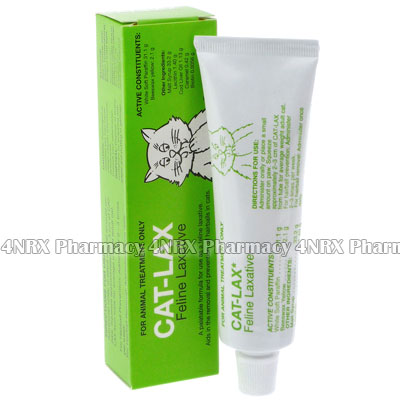 |
Home  4NRX Pet Pharmacy 4NRX Pet Pharmacy  Catlax Laxative Paste (White Soft Paraffin/Beeswax) Catlax Laxative Paste (White Soft Paraffin/Beeswax) |
|
|||||||||
|
|
Catlax Laxative Paste (White Soft Paraffin/Beeswax)
What is Catlax Laxative Paste (White Soft Paraffin/Beeswax) used for? Catlax Laxative Paste (White Soft Paraffin/Beeswax) is an oral laxative paste used to treat cats suffering from gastrointestinal blockages caused by hairballs. The medication operates by increasing the action of the digestive tract to clear any obstructions present in the digestive tract. It may also be prescribed at lower doses to prevent hairballs from forming. How should I use Catlax Laxative Paste (White Soft Paraffin/Beeswax)? Strictly follow the instructions provided by your veterinarian while using Catlax Laxative Paste (White Soft Paraffin/Beeswax) to get the safest and most effective results. Each dose should be two to three cm of medication squeezed from the tube given orally or applied to the paw of the cat to be consumed during grooming. This should be performed once daily when removing a blockage or two to three times each week when preventing hairballs. Always ask your veterinarian any questions you have about using the medication to ensure the correct administration. What are the side effects of Catlax Laxative Paste (White Soft Paraffin/Beeswax)? When administered correctly, the use of Catlax Laxative Paste (White Soft Paraffin/Beeswax) will not normally cause side effects in most cats. Immediately inform your veterinarian if you do notice any unusual symptoms appearing such as severe diarrhea, fatigue, faintness, or trouble breathing. These may require reduced dosages or other adjustments to prevent more problems from occurring. Please Note Before using Catlax Laxative Paste (White Soft Paraffin/Beeswax), inform your veterinarian if your cat is pregnant or has digestive problems, a history of allergic reactions, or if it has had a bad reaction to similar treatments in the past. Strictly follow all instructions provided to you by your veterinarian while using Catlax Laxative Paste (White Soft Paraffin/Beeswax). Optimum and safe dosage can differ based on the animal and the condition being treated. As this medication may be unsafe for certain cats, it is essential you always inform your veterinarian if your pet is pregnant, as well as if it has any allergies, other illnesses, or ongoing health conditions, and if it is taking any other form of medication, supplements, or herbal products. Immediately seek emergency medical care if your cat has an allergic or hypersensitive reaction. Common signs of a reaction include hives, swelling, skin rashes, chest pains, as well as trouble breathing or swallowing. 
|
||||||||||||||||||||||